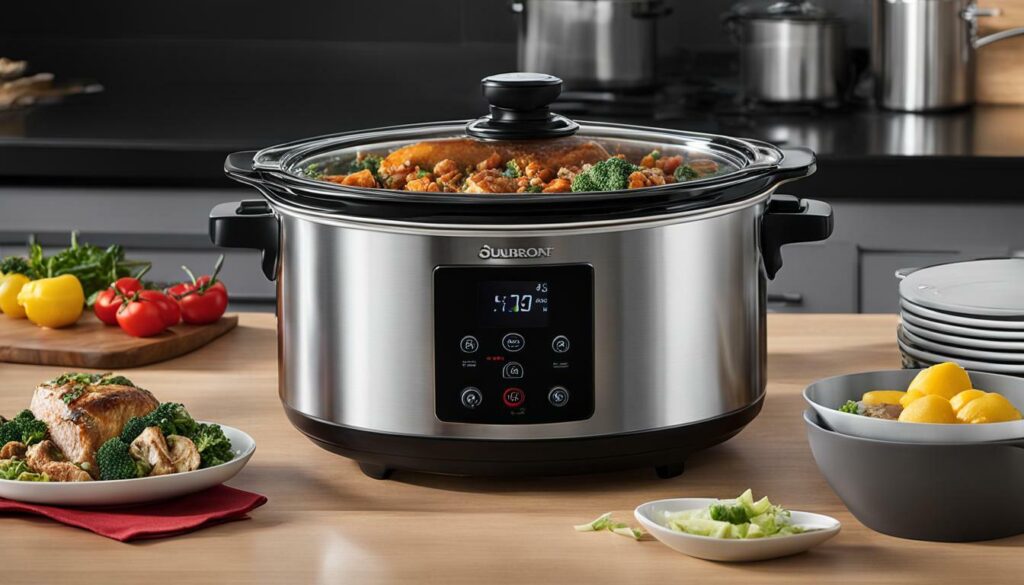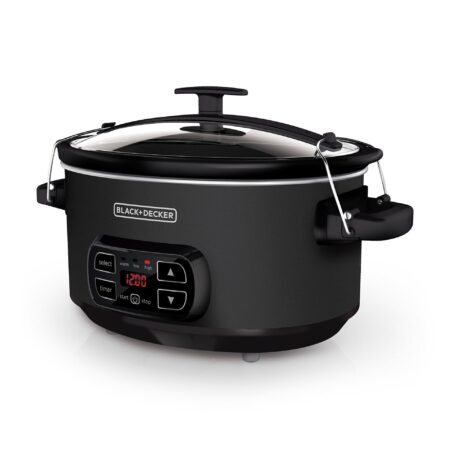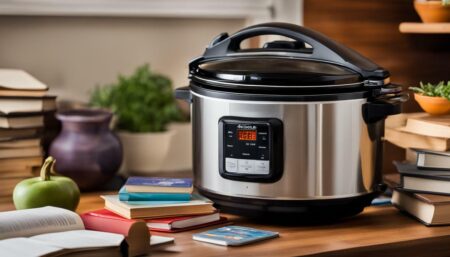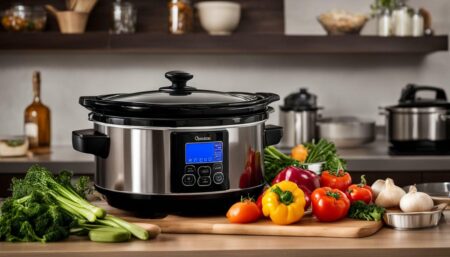Slow cookers have become an essential appliance in many households, providing an easy way to prepare delicious, home-cooked meals with minimal effort. When it comes to choosing a slow cooker, the materials used in its construction can significantly impact its durability and performance.
In this guide, we’ll take a closer look at the materials used in small slow cookers and how they contribute to the appliance’s overall durability. We’ll explore the advantages and disadvantages of various materials, allowing you to make an informed decision when choosing a slow cooker that will last for years to come.
Key Takeaways:
- Choosing the right materials for your slow cooker can significantly impact its durability.
- Materials such as stainless steel, ceramic, nonstick coatings, and aluminum all have their unique advantages and disadvantages.
- Other factors, such as handles, lids, and heating elements, can also contribute to the appliance’s overall longevity.
- Proper care and maintenance can extend the lifespan of your slow cooker.
- By considering the materials and additional factors, you can choose a top-rated slow cooker that will provide reliable and long-lasting performance in your kitchen.
Importance of Materials in Slow Cookers
When it comes to slow cookers, the choice of materials is crucial. The materials used affect both the cooking performance and overall durability of the appliance. Therefore, it is important to understand the different materials used in slow cookers before making a purchase decision. In this section, we will discuss the significance of materials in slow cookers and how they contribute to the appliance’s functionality and longevity.
The materials used in slow cookers impact the appliance’s performance in many ways. For example, some materials conduct heat differently, resulting in variations in cooking time and temperature. Other materials have distinct cleaning requirements that may affect the appliance’s durability over time. Additionally, some materials withstand wear and tear and remain durable over years of use with minimal maintenance, making them a good investment for long-term use.
When choosing a slow cooker, consider the material used to make it. The right material, paired with the right features, can give you reliable and long-lasting performance. In the next section, we’ll cover some of the most common materials used in small slow cookers, exploring their key characteristics, pros, and cons to help you make an informed purchase decision.
Common Materials Used in Slow Cookers
When it comes to slow cookers, understanding the materials used is crucial for ensuring durability and reliable performance. Let’s take a closer look at the most commonly used materials in small slow cookers, their characteristics, pros, and cons, so you can make an informed decision before making a purchase.
Stainless Steel
Stainless steel is a popular choice for slow cookers due to its durability and resistance to corrosion. It distributes heat evenly and retains warmth for longer periods, making it an ideal material for slow cooking. Stainless steel slow cookers are long-lasting and easy to clean, making them a reliable addition to any kitchen.
Ceramic
Ceramic slow cookers are known for their excellent heat distribution and retention. They are perfect for slow-cooking dishes that require a longer cooking time, as they retain heat longer than other materials. Ceramic materials are also non-reactive, which means they won’t impact the flavor of the food. However, ceramic slow cookers are fragile and prone to cracking, so it’s essential to handle them with care.
Nonstick Coating
Nonstick-coated slow cookers offer convenience and ease of cleaning. They prevent food from sticking to the surface, making clean-up a breeze. Nonstick materials are also durable and resistant to scratches and dents, making them a worthwhile investment. However, it’s crucial to note that nonstick coatings can scratch easily, which may cause damage to the surface.
Aluminum
Aluminum is a lightweight and affordable material for slow cookers. It heats up quickly and distributes heat evenly, making it an excellent option for slow cooking. However, aluminum is prone to wear and tear and can be easily scratched or dented, especially when cleaning. Additionally, aluminum is reactive with acidic foods, which can affect the taste of the dish.
Other Considerations for Durability
When considering the materials used in slow cookers, it’s important to note other factors that may impact the overall durability of the appliance. Look for slow cookers with sturdy handles and lids that fit tightly to prevent heat loss. Additionally, inspect the heating elements to ensure they are securely attached and won’t malfunction.
By understanding the different materials used in small slow cookers and their impact on durability, you can make an informed decision when purchasing a slow cooker. Consider the pros and cons of each material, keeping in mind what’s important to you in terms of performance and longevity.
Stainless Steel Slow Cookers
Stainless steel is one of the most popular and high-quality materials used in slow cookers, and for good reason. It’s incredibly durable and resistant to corrosion, making it a long-lasting option for your kitchen appliance. Not only does it look sleek and modern, but it’s also easy to clean and maintain.
When shopping for a slow cooker, consider stainless steel models, as they are built to last. High-quality slow cooker materials like stainless steel can tolerate years of wear and tear, making them an excellent investment for your kitchen.
Stainless steel slow cookers also offer excellent heat retention, keeping your food hot and fresh for hours after cooking. Plus, they are dishwasher safe and effortless to clean, saving you time and effort in the kitchen.
Overall, stainless steel slow cookers are a popular option due to their longevity, reliability, and performance. Consider investing in this durable material for a top-quality slow cooker that will last for years to come.
Ceramic Slow Cookers
Ceramic slow cookers are another popular choice due to their ability to distribute heat evenly and retain heat effectively. The ceramic material also provides a natural, non-reactive cooking surface that doesn’t leach harmful chemicals or flavors into your food.
One of the biggest advantages of ceramic slow cookers is their ability to maintain a consistent low temperature throughout the cooking process. This ensures that your food is cooked evenly and thoroughly, without drying out or becoming overcooked.
In terms of durability, ceramic slow cookers are known for being long-lasting and reliable. The sturdy ceramic material is resistant to scratches, dents, and other types of damage. Additionally, ceramic slow cookers are relatively easy to clean and maintain, making them a convenient option for busy home cooks.
When considering the best slow cooker materials, ceramic is certainly a top choice. Its ability to distribute heat evenly and provide a natural cooking surface make it a great option for a variety of slow-cooked meals.
Nonstick Coated Slow Cookers
Nonstick-coated slow cookers are popular because they offer convenience and ease of cleaning. The nonstick coating prevents food from sticking to the surface, making it easier to remove food and clean the appliance afterward. This material is also lightweight and heats up quickly, making it a great option for those who want to cook their meals in a hurry.
One of the main benefits of nonstick-coated slow cookers is that they require less oil or fat to cook food, which means that you can prepare healthier meals for your family. The nonstick coating also helps to preserve the natural flavors and nutrients of the food, ensuring that your meals are delicious and nutritious.
When it comes to durability, nonstick-coated slow cookers are a great option. The nonstick coating is designed to last for years and can withstand high temperatures without chipping or peeling. However, it is important to note that nonstick-coated slow cookers should be used with utensils made of silicone, nylon, or wood to prevent scratching the surface.
Overall, nonstick-coated slow cookers are a great option for those who want to cook healthy meals quickly and easily. They are durable, reliable, and easy to clean, making them a top choice for busy families.
Aluminum Slow Cookers
Aluminum is a popular material for slow cookers because it is lightweight and heats up quickly. However, durability may be a concern as aluminum can dent and scratch easily. It is also not as resistant to corrosion as stainless steel.
However, there are ways to ensure that your aluminum slow cooker remains durable. Look for models with reinforced handles and a sturdy base. It’s important to avoid using metal utensils in the slow cooker as they can scratch the surface and compromise its durability. Instead, opt for wooden or silicone utensils.
It’s also important to clean your aluminum slow cooker properly to ensure its longevity. Avoid using abrasive cleaners or steel wool, as they can scratch the appliance’s surface. Instead, use a soft sponge or cloth with warm, soapy water to clean the interior and exterior of the appliance.
Overall, aluminum slow cookers can be a good option for those looking for a lightweight and affordable slow cooker. However, it’s important to consider the potential for reduced durability and take steps to care for the appliance properly.
Other Material Considerations for Durability
Aside from the main materials used in small slow cookers, there are other factors to consider when it comes to durability. These additional considerations can make a difference in the longevity and reliable performance of your appliance.
Handles: Sturdy handles are essential for safe and easy handling of your slow cooker. Look for handles that are securely attached to the body of the appliance and made from durable materials such as metal or heat-resistant plastic.
Lids: The lid of your slow cooker should fit tightly to ensure heat and moisture are retained during the cooking process. A well-fitting lid can also prevent spills and splatters, making it easier to clean your appliance. Consider choosing a slow cooker with a glass lid, so you can monitor your cooking without having to lift the lid.
Heating Elements: The quality and placement of the heating element in your slow cooker can affect its performance and durability. Look for appliances with heating elements that are evenly distributed throughout the pot and made from high-quality materials. A sturdy heating element can also prevent the pot from cracking or warping over time.
By considering these additional material factors when choosing a slow cooker, you can ensure that your appliance is durable and reliable for years to come.
Tips for Caring and Maintaining Slow Cookers
Proper care and maintenance of your slow cooker can significantly extend its lifespan and ensure it remains a long-lasting and durable appliance in your kitchen. Here are some tips to keep your slow cooker in top shape:
1. Read the manufacturer’s instructions
Before using your slow cooker, make sure to read the manufacturer’s instructions carefully. Familiarize yourself with the recommended usage and cleaning guidelines.
2. Clean after every use
After using your slow cooker, clean it thoroughly to remove any food residue or grease. Use warm, soapy water and a soft sponge or cloth to clean the inner pot and lid. Do not immerse the base in water.
3. Avoid abrasive cleaners
Avoid using abrasive cleaners or scrubbers that can scratch or damage the nonstick coating or any other surfaces of your slow cooker.
4. Handle with care
Handle your slow cooker with care, especially the inner pot and lid. Avoid dropping or hitting them against hard surfaces, as this can damage the materials and affect the performance of the appliance.
5. Store properly
When storing your slow cooker, make sure to keep it in a cool, dry place away from direct sunlight. Avoid stacking other heavy items on top of it.
By following these tips, you can ensure that your slow cooker remains a durable and long-lasting appliance in your kitchen, providing reliable performance for all your cooking needs.
Conclusion
In summary, the materials used in small slow cookers play a vital role in their durability and cooking performance. Stainless steel and ceramic are two of the most popular materials due to their longevity and reliable heating capabilities. Nonstick coatings offer convenience and ease of cleaning, while aluminum materials are lightweight and heat up quickly.
When selecting a top-rated slow cooker, it’s crucial to consider the durability of the appliance beyond just the main materials. Additional factors such as handles, lids, and heating elements can also affect the overall longevity of the slow cooker.
To ensure your slow cooker provides long-lasting and reliable performance, it’s crucial to practice proper care and maintenance. Regular cleaning, avoiding sudden temperature changes, and storing the slow cooker in a dry and cool place can help extend its lifespan.
By taking into account the materials used in slow cookers and their impact on durability, you can make an informed purchase decision and select a top-rated slow cooker that will deliver delicious and consistent results for years to come.
FAQ
Q: What materials are commonly used in small slow cookers?
A: The most commonly used materials in small slow cookers are stainless steel, ceramic, nonstick coated, and aluminum.
Q: Are stainless steel slow cookers durable?
A: Yes, stainless steel slow cookers are known for their durability and resistance to corrosion.
Q: What are the advantages of ceramic slow cookers?
A: Ceramic slow cookers offer even heat distribution and excellent heat retention, resulting in delicious and evenly cooked meals.
Q: Do nonstick-coated slow cookers offer any benefits?
A: Yes, nonstick-coated slow cookers are convenient and easy to clean, making them a popular choice for many home cooks.
Q: Are aluminum slow cookers durable?
A: Aluminum slow cookers are lightweight and heat up quickly, but they may not be as durable as other materials. Consider this when making your purchasing decision.
Q: What other factors should I consider for slow cooker durability?
A: In addition to the main materials used in slow cookers, factors such as handles, lids, and heating elements can also affect the overall durability of the appliance.
Q: How can I care for and maintain my slow cooker?
A: To ensure the longevity of your slow cooker, it’s important to follow proper care and maintenance guidelines. This includes regular cleaning and avoiding sudden temperature changes.
Q: Why is understanding slow cooker materials important?
A: Understanding the materials used in small slow cookers allows you to make an informed decision and choose a top-rated slow cooker that offers both durability and reliable performance in your kitchen.






